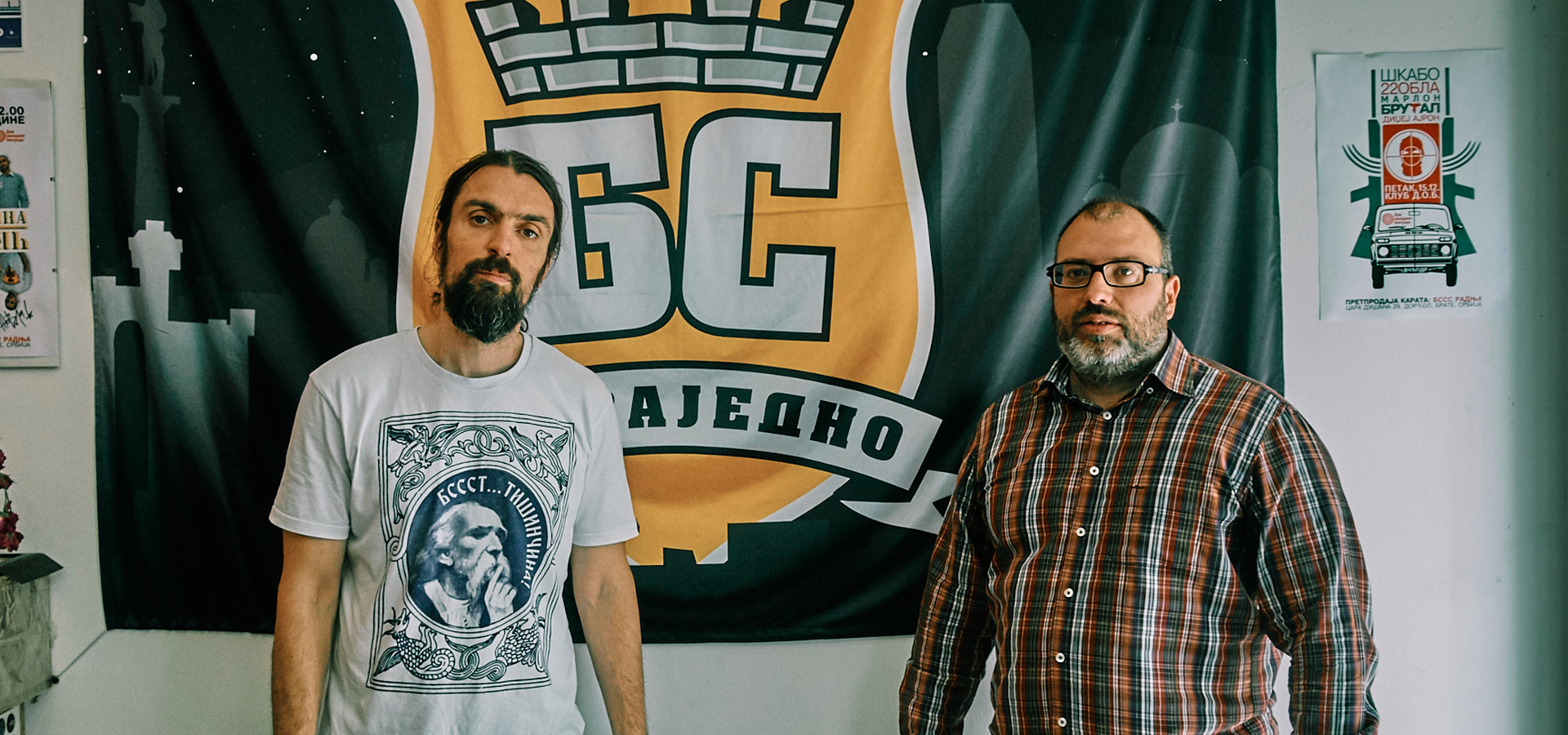Fedja Dimovic and Bosko Cirkovic: To us, the streets of Belgrade are a metaphor for life
Fedja Dimovic and Bosko Cirkovic the members of the Belgrade syndicate and Dorcol boys "in their best years" continue to throw down bars with the same intensity as two decades ago. Talking to 011info, this due reveals how Dorcol influenced the shaping of their music and why they consider their neighborhood the guardian of old Belgrade's spirit. They announce a book on "Beogradski sindikat" which is in the works at the moment.
Both of you are from Dorcol. How did you view this neighborhood when you were kids, and how does it compare to today?
Skabo: I moved to Dorcol from New Belgrade when I was three and a half years old. At first everything seemed similar to New Belgrade. The Sava, Danube rivers and their ramparts were right there and the buildings looked similar too. But as I grew up, I got to know more about Dorcol and its trademark identity, that bad-boy hospitality. We knew order and how to properly greet guests.
It feels to me that nowadays Belgrade lost that old identity, but still I think it lives on Dorcol at least.
Fedja: You can see that influence of capitalism on Dorcol. A lot has been built, but sadly some of the old buildings that were the soul of this neighborhood were torn down. The structure of the people living here also changed. Dorcol used to be a poor neighborhood but today it's an 'in' place to live. That's why there's a stark difference between some parts of Dorcol and you can tell where the poor and the wealthy live.
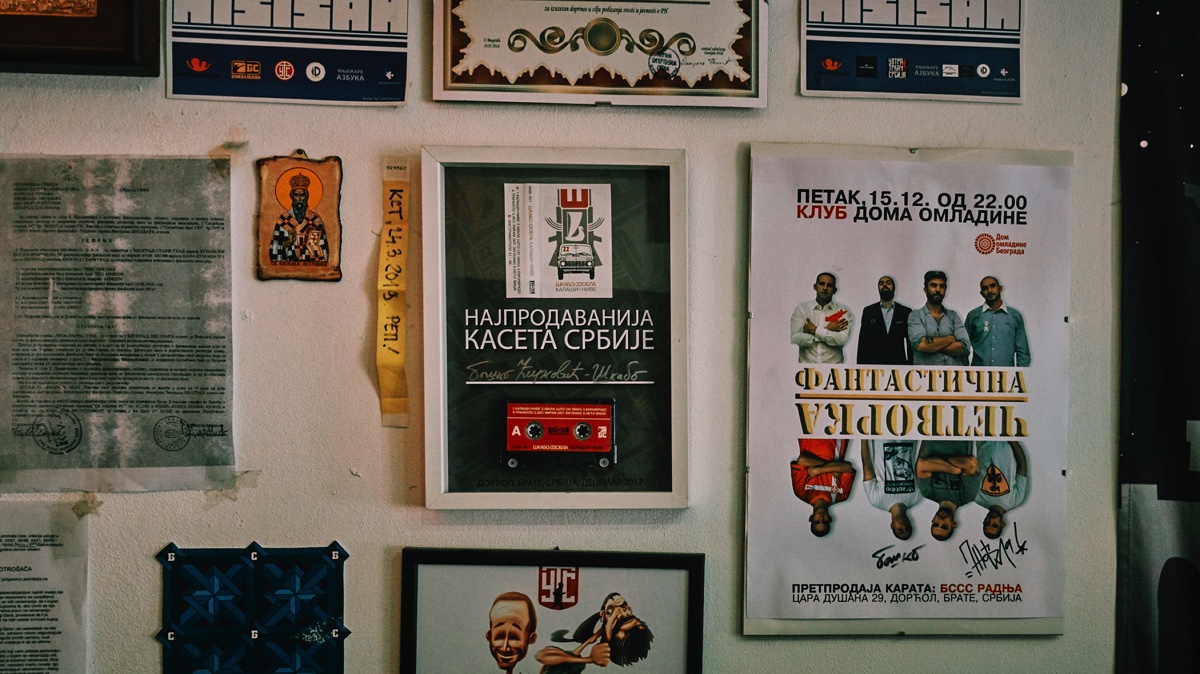
Back when we were kids, this was a quiet area in the sense that there were no cafes or taverns, nor was Dorcol regarded as a trendy place for nighlife. For example, the Strahinjica Bana street was one of the least crowded streets in the neighborhood. We'd set up goal posts for miniature soccer because there would be maybe one car passing every hour or so.
That's what changed compared to when we were kids and the generation that would hang out on some wall in the neighborhood or in Kalemegdan park. Of course to this day, if you pass through the yard of our Mika Alas (once Pera Popovic Aga) school, you can see some new kids chasing the ball or hanging out.
So the spirit of Dorcol did change a little, but not too much because there's just so much tradition that's deeply rooted in us all. In our own songs we often say it's hard to erase Dorcol. This is, after all, one of the oldest parts of Belgrade and history isn't that easily defeated.
When you look at the historical events that took place here and the names that we mention...
For example, I grew up in Brace Jugovica street and Zmaj Jovina is right next to it, followed by Strahinjica Bana and other streets with the names of Kosovo heroes from the uprisings against Turks. That's a neighborhood that isn't just the soul of Belgrade but the entire Serbia. That's why everyone in the region have heard of Dorcol.
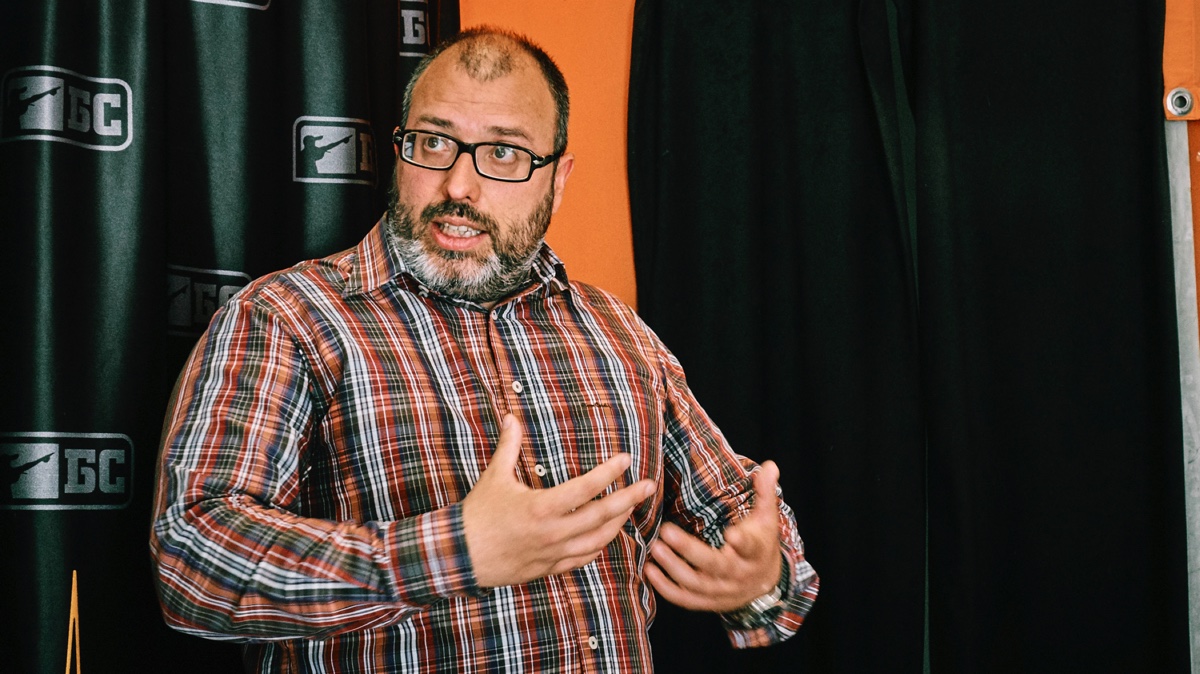
It was precisely this kind of environment growing up that influenced your work today.
Fedja: Of course it did. Once you become aware and interested, the first thing you look up is what people are your streets named after and why.
Skabo: Especially when it's crossed with what you were taught by the school system and other sources of information. You have your street name in front of your eyes every day and then you hear people talk about it in school or on TV - it's natural you become interested in it.
Fedja: It only shows how important these historical figures are that even the Communists, who changed various street names, still didn't dare touch this myth of Kosovo, the way it's minimilized today.
Skabo: I think that's the right way - don't give up the good, whether it belongs nominally with this or that tradition. If it is unequivocally on the side of good, the sacrifice of people who gave their all to defend freedom and their country, it is older than any political ideology.
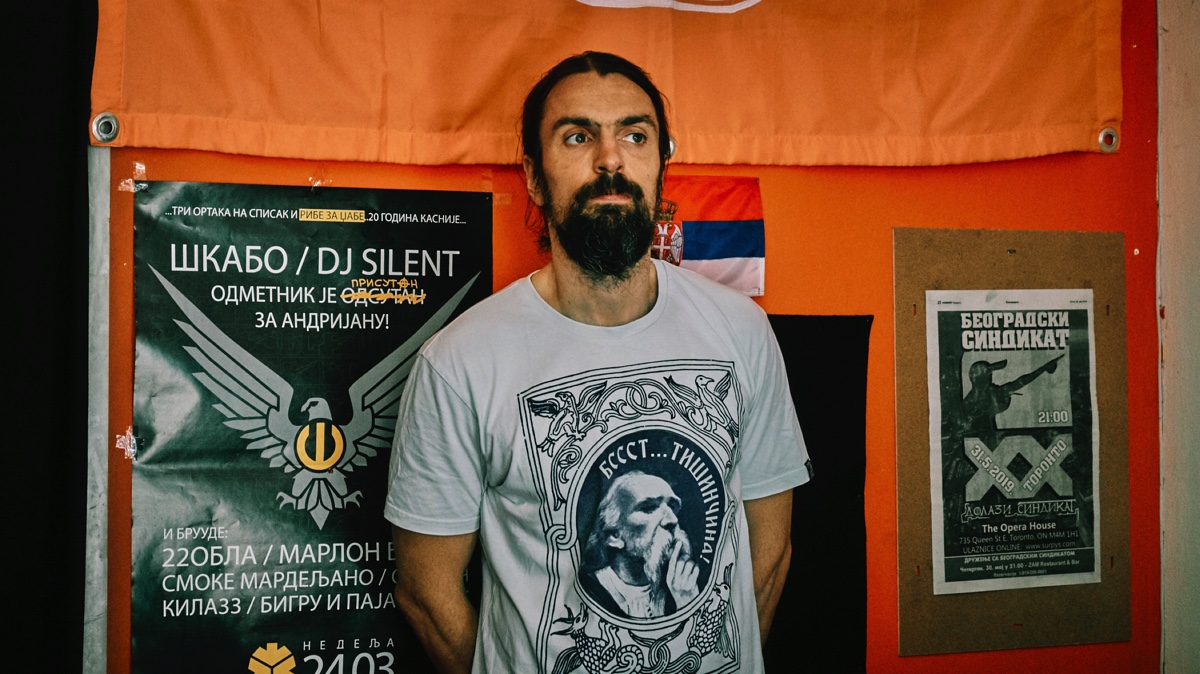
I'm happy that today our school is named after Mika Alas, a great man, but I'm also sad it no longer bears the name of Pera Popovic Aga, because that was the name it was built with. Gospodar Jovanova, Kapetan Misina streets - they reflect the values of these great people they were named for.
Do you think that today's kids from the neighborhood also thinks this way about Dorcol.
Fedja: Definitely, yes. I know many kids from the block who follow that line of thinking.
Skabo: The spirit of this neighborhood survived more than the spirit of our city as a whole. Because neighborhoods are generally harder to break up than the whole city, with all the profits funneling to the center. The profits aren't necessarily in the hands of people who appreciate our identity. It happens to all the cities in the world.
Fedja: The Kalemegdan is also extremely important to this area. It was there that most of us made our first steps, playing at the fort, climbing the walls - we would pretend to be knights and enter the ruins. This is what enters your subconscious and becomes a part of your being. It can't skip a single generation.
Through contact with younger generations, I can see that they are still growing up in that Serbian city spirit.
When did you start that whole story with music and writing lyrics?
Skabo: I started writing songs in 3-4th grade of school and recorded my first song in 1991. Some were written in epic poem form. I didn't even know back then that there existed this thing called rap which, if you start listening it and have any kind of inclination towards music, you will have your own band within a year.
That's how I went through a similar phase with bands. I played the bass guitar and it was a sensible story. I feel bad it's different today. Namely I was present on an event organized by my Serbian language professor in Zemun high-school. This is where a kid between 15-16 years of age asked me what I thought about punk and metal. I said I supported them of course and he told me he needed band members. "We had a band, played in Bozidarac, but there wasn't enough audience so we split up", he said to me.
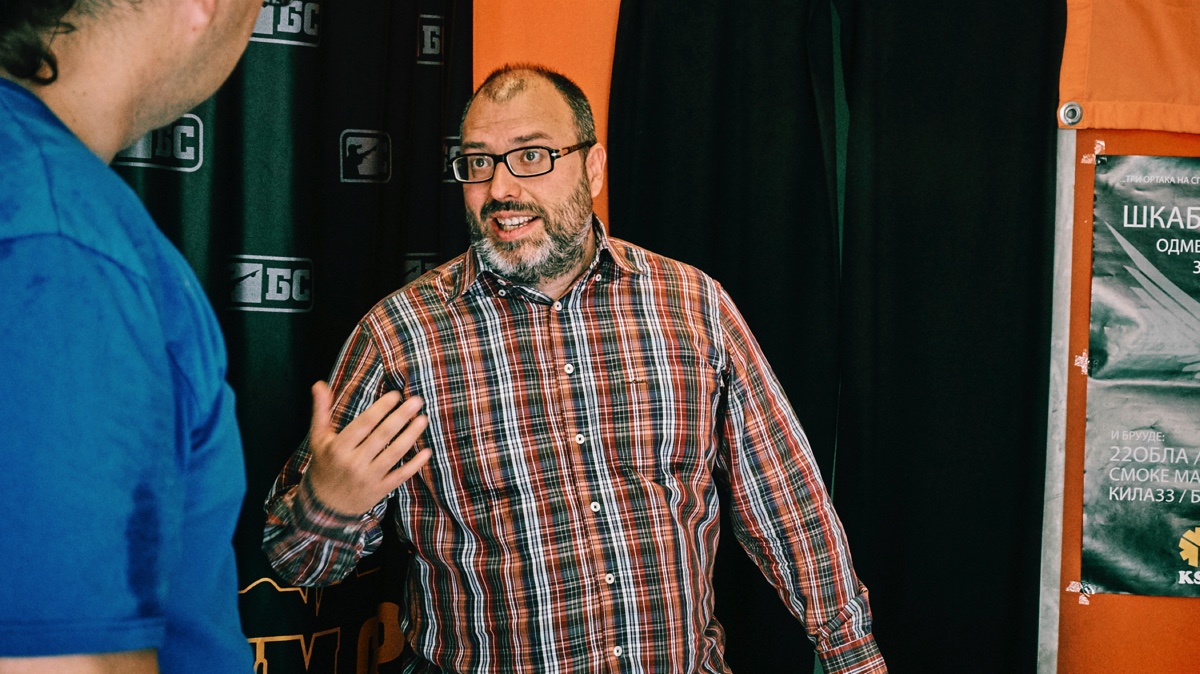
In that time, we had fewer trends come to us from the world and when they did, we'd idolize them and strive for them. Making music came naturally to us and we felt that it was our own. The songs we wrote fell under the epic poetry domain from the very start. Maybe it was because we were kids of our time, or because of our street names, but it always attracted me more than anything else.
Fedja: In school, when we had written assignments in Serbian language, we could write a poem instead of writing a five-page essay. That's how I discovered early on that I am gifted for this and that I can express myself through poetry. I think this is the point of poetry, that in certain cases it bears more weight than prose.
I think music and sports are the two healthiest things a kid can do from an early age, so my parents supported me in it from very early on. I learned classic guitar, though I preferred the dirtier riffs and punk. That's how in fifth grade I recorded my first song when my godfather Mica got a synthesizer with beat programs. There were some hip-hop beats and we used it to play our music.
We would gather up in Dusanova street, in our friend's basement, and rehearse there as kids. This was quality time spent with friends. Instead of going off pulling stupid stunts, you sit there with your best mates and play some music. It's what we do to this day as "Beogradski sindikat".
In eighth grade, I was playing with a serious punk band. We even held a solo concert in the small SKC hall. That was when we played in the "Modro oko" studio near Bajloni market, which later became "Ponos radio" where they played folk country music. Back then, though, it was where punk, metal and hardcore music played. This was where we got spotted by some older lads who invited us to perform with them in SKC. We were so surprised by their offer, that we almost thought it was a prank. It was right before the war started. We got around a hundred tickets to give out, but we didn't want to invite all our friends just in case the whole thing was a ruse. However, the concert was legitimate and it turned out to be a great gig.
It seems that nowadays there aren't as many young bands, while in the past practically every street had at least one. Why do you think that is?
Skabo: To me that's completely unnatural. We live in a time of numbers and progress bars. People want to make a story all at once and immediately know what's the next step. Just how the audience would want to know what they'll play, the bands also want to know how much audience there will be. If there isn't enough, they just give up.
They were served this story that only what you do in front of a full club matters. None of them ever watched the movie "24 hour party people" or anything similar, to see how legends and music movements were born - starting from concerts attended by 15-16 people. Nobody cares about this nowadays. They want the performance to be hardcore, but not the effort and investment.
We were sold this 'reality' format of making stars in the form of talent shows - just "bam" and there you are. There's no more slow uphill progress, nor do the young people nowadays expect it to be. Of course, there are positive exceptions.
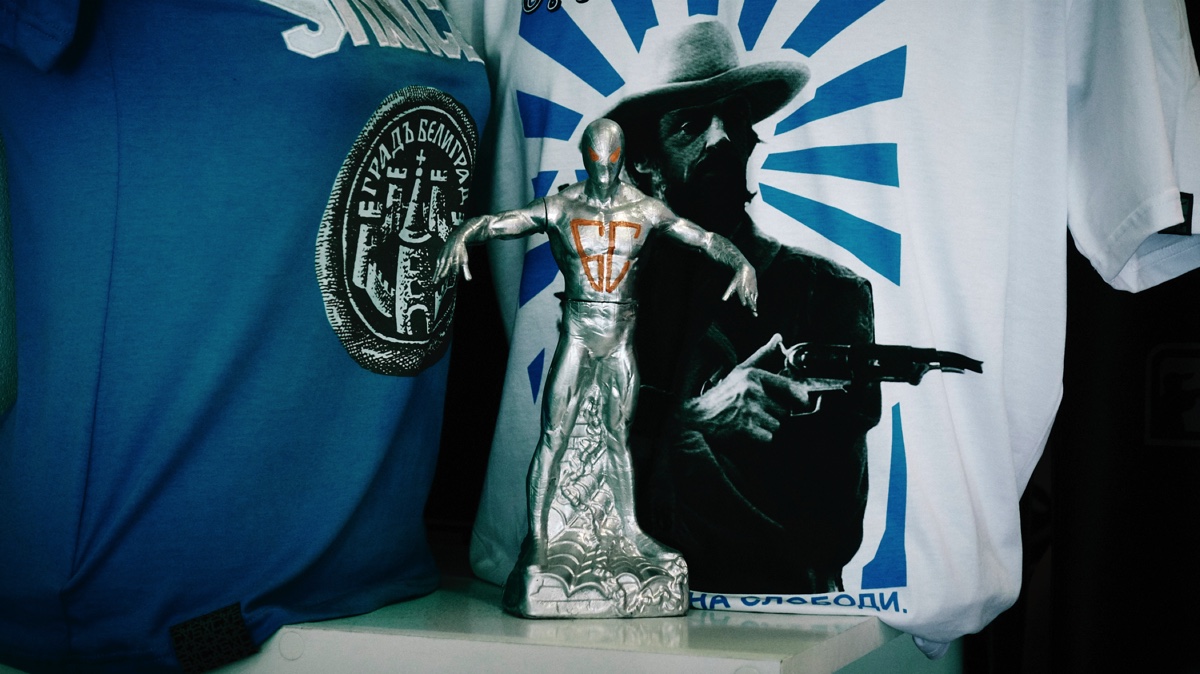
Right now, I don't know of a single rehearsal studio in the neighborhood and we used to have several. Someone had a miniature business venture going based on the fact that there was a need for a room where bands from the hood could rehearse their music.
Fedja: Everyone want to be stars right away.
I remember the period when we as kids played punk, in high school, a generation before us, there was also a group of lads who had their own band.
When we were starting off as "Beogradski sindikat", our concerts were listened by our friends who would come out of respect for us, but didn't even know what we were about. They'd come and watch us in awe. The atmosphere was peaceful and respectful. People would listen because they wanted to hear and understand the lyrics. The greatest honor was hearing your own song on the radio. There was no internet or YouTube. I remember that when we first made it to a top list with our first album, we were up against Kando, Kondza and Nebojsa, Darkwood dub...
Bands originated from friendships and the need to say something and be heard, not because any of us wanted to be stars.
We didn't get paid for our first performances, but rather everyone could add three friends to the entry list and the girls could get in for free. That, and we'd get a free drink or two. For later performances, there was never any problem negotiating the fee, but rather how many friends I can put on the list.
The first big concert we did in the "Dom omladine" could only accommodate about 1500 people and half of those were on our friends list. The organizers were like "are we doing this concert for money or what?'
Things came to us spontaneously and we came into decent success. Here we come to a philosophical question - what is success? Is it making something that will last a long time, or having 50 million views on YouTube?
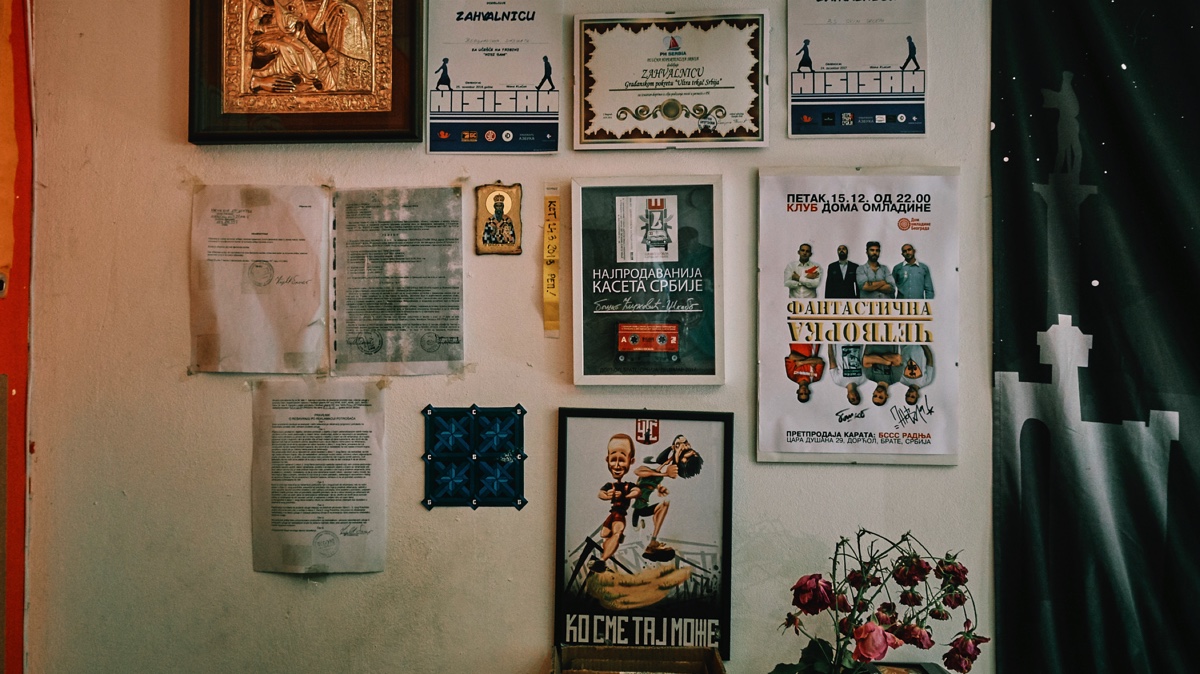
In your songs, you often mention "the street" as a broad metaphor. On the other hand, we tend to say "You want to end up in the street or do something with your life?". What is 'the street' for you?
Skabo: In our songs, 'the street' is a metaphor for life. It used to be just that for so many people. Folks felt freer to walk the streets. Today you always worry what's out there. Not in the sense that it's dark or dangerous. Nowadays, you have a crowd of people who walk the streets with their eyes peeled on their phones, which can be dangerous because we can run into each other, fall into a hole...nowadays the club is more dangerous than the street.
Fedja: The street mostly implies friendship and a healthy childhood, movement, doing sports instead of staring at a monitor. It was something that has to be a matter of home education. I believe that the parents should encourage children to socialize, do sports, go out instead of handing them a tablet. If you give a child of three a tablet, their motor skills will develop accordingly.
Of course, you can't isolate the child. You have to live in accordance with the 21st century, but there should be moderation in all things. Don't isolate yourself in front of a monitor so you have an illusion that you're a part of some social network community.
Sports, music and creative pursuits are the best way to raise your child, in addition to school of course. As far as I'm concerned, the church is also an important factor.
Skabo: My suggestion is to get outside and run around in those streets, look at the buildings, look up - it can be very interesting. You'll see all the nice things that the street can bring.
Fedja: I went on that tour last summer - "Belgrade under Belgrade". I was a tourist in my own city and learned a lot of new information. They are things that we often take for granted.
Skabo: it would be nice if those things started as early as junior school. For example, this year in Mika Alas school, two teachers started the initiative to draw a mural of Mika Alas and another mom and myself wrote a hymn and composed a song. The kids would then listen to the song and know what it's about. The streets are there because they symbolize certain values. Kids love to participate in those things because that's how they build their identity. I'm not just from my own family but from my neighborhood, my city, my country. That's how you create your system of values.
Fedja: In junior school we had the "Musical youth" program where our music teacher would take us to shows and concerts after her working hours. This was all so important to us. We listened to Mozart and the Beatles and learned about various things.
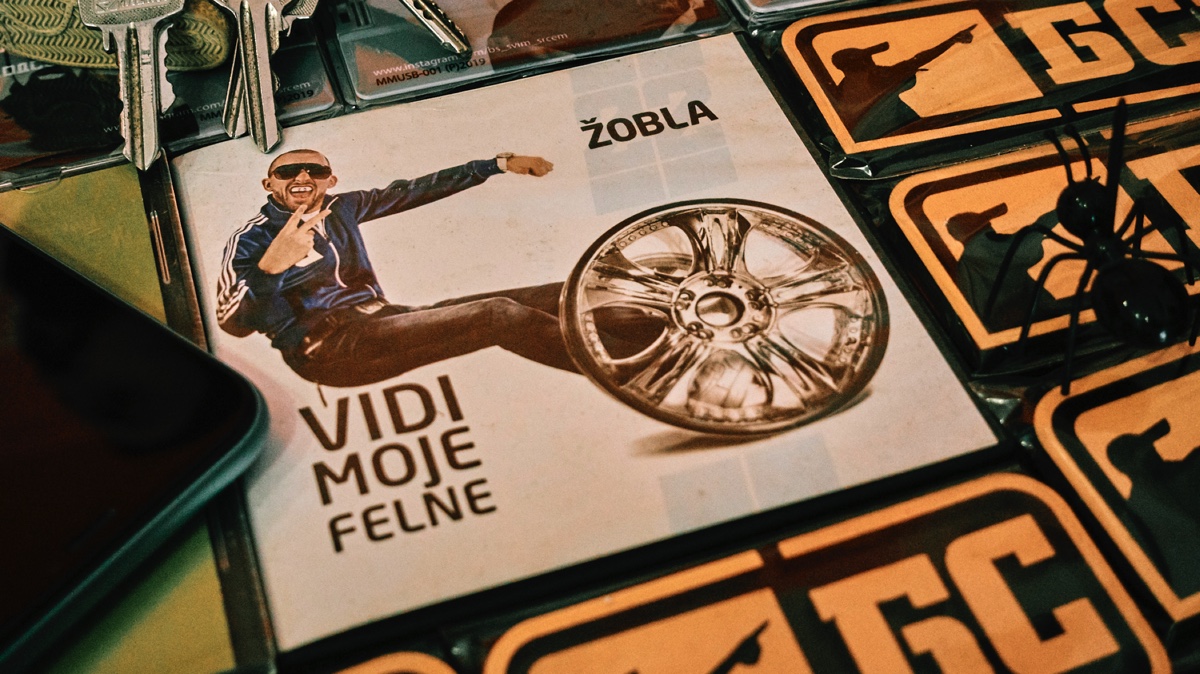
"Beogradski sindikat" band was formed three days before the bombing in 1999. What brought you all together?
Skabo: it was the music. We didn't like how they did things back then, except for some people from the hood who we did like. The idea was to represent that local story. What we didn't like on stage was that everyone was just copying what people were doing in America. We wanted to borrow the form, but make something original with it.
Fedja: There used to be stories that you can't rap in Serbian, so people would mix up their lyrics with English. On the other hand, there was that influx from Croatia, greatly influenced by the West, so they made that scene before we did. Then we had kids growing up on Croatian rap who would then go on to rap like Croatians, which annoyed us because we thought Belgrade should also have its own style.
We didn't gather as a band, as people often say, as in - we sat down and had a plan or ideology. It all came naturally to us from our own upbringing. It made sense to us that the text on our album would be written in Cyrillic. We learned those letters in school first. And it was normal to us to put in some Dorcol inside jokes that would represent our songs and our city and country. As Momo Kapor used to say: "Patriotism is a matter of upbringing". I think this is a normal thing which is why after 10 rap songs we did one about the battle in Kosovo.
The same way as black people sing about their heroes, we sing about ours.
Skabo: Later they used to talk about us negatively that we're like 'folklore singers'. Yes we are - we have that tradition that existed much before rap and we adopted that as a trademark feature.
Fedja: Today it's considered an urban trend to use reggae - a strand of Jamaican ethnic music - and if you use ethnic motifs from your country, then you're 'basic'.
Why doesn't "Beogradski sindikat" perform anymore?
Skabo: We get invitations for concerts all the time, but there are infrastructural problems. Around 2011, we drew a line and said we wouldn't perform around clubs. It was the consequence of a certain experience. Namely, we performed in a club where there were seating booths, one of which was occupied by some fellas who sat there frowning the entire time until we performed the song 'Alal vera', which is when they jumped up to sing with us. Some people wouldn't see this as a big deal, but we care for every aspect of our performance, including that one.
On the other hand, what really suits us are festivals, but they happen during the summer when we can't usually attend during various circumstances. We get invited a lot, everyone would love to hear "Beogradski sindikat", but there are objective issues that prevent us from performing more often.
We all have some kind of other way to earn a living - the performances don't really make for most of our income.
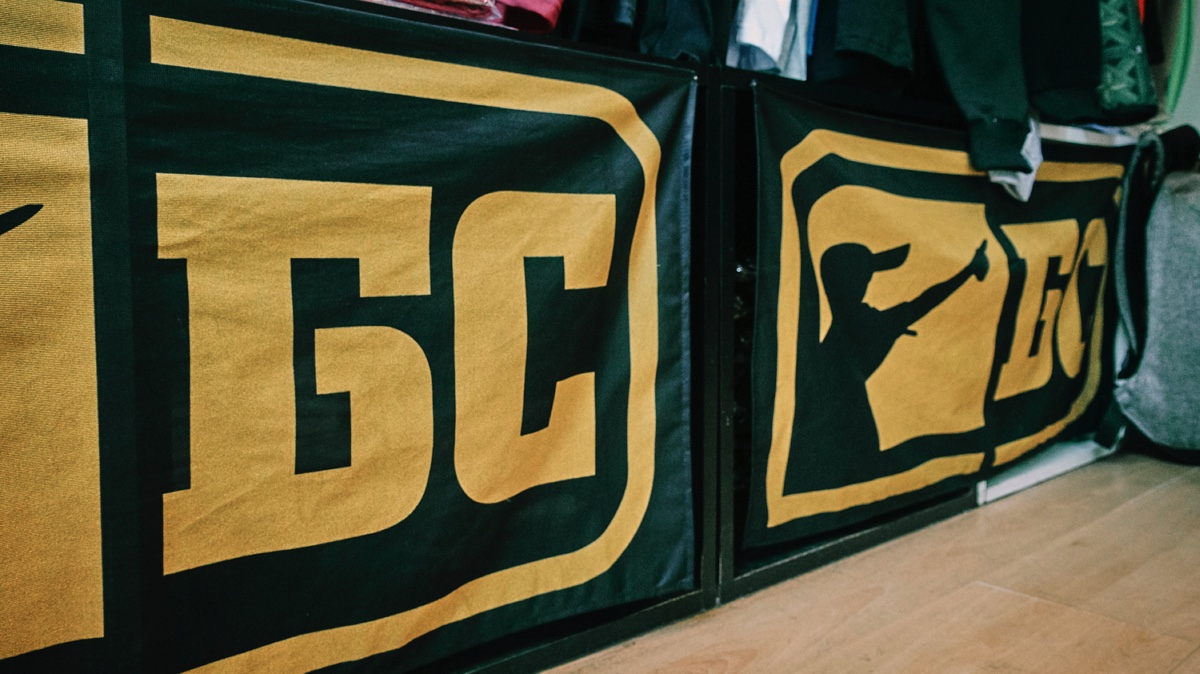
Instead of publishing entire albums, you started releasing only singles. Why is that?
Fedja: Force of circumstance. We used to publish on average one album every five years. But the older we got, it was exactly the fact that we don't earn a living with music as well as worries about family, children, obligations, that took away our time at the expense of music. This is why we slowed down a little but still managed to gather up a number of songs that weren't enough for an album. Still, we were sorry to have good songs but never let them see the light of day. For example, "Dogodine u Prizrenu" - the moment to publish it was right now, and not in three years until we gather up more songs.
That's how the story about the "Disident balad" came out in 2010, as part of the album "Diskretni heroji" while the song itself originated five years earlier.
What goes in our favor is the trend that nowadays they publish singles more often than albums. Although it kind of bothers me a little because it's always been important to me to round up every story. Every album that came from "Beogradski sindikat" always had a story that built up from first to final song.
Skabo: If, for example, you take "Svedok saradink" or "Alal vera" out of their context, you can be confused on what on earth we are talking about.
Fedja: If we had published those songs as singles, nobody would've understood the context. They would all think that we are affirming some bad mindsets - satire is hard enough for some to grasp as is.
The album is the whole story, told from start to end, and it is something we want to do again. To present to people what we are now, because we started off as kids and ended up as old dudes, having told a story that isn't just a story about life, but also our growing up and maturing.
When they talk about us, people often present you as 'those rapping kids'.
Skabo: Yes, yes. It was just recently that a Canadian Serbian newspaper published an article about us. I talked to a guy half my age and we had a great conversation, but then I found it hilarious that in his article he wrote 'These young people from Belgrade..." I mean, I do feel young, but...
Maybe that's the influence from 1999 when you started off strong and didn't lose any drive or speed to this day?
Skabo: Oh, I don't think everyone would agree on that. :) We do our best. I think it helps us all stay active and healthy.
Fedja: Not many of our friends, acquaintances and colleagues in the music industry who started out at the same time as us remained faithful to a certain musical style. On the other hand, if we talk about a national story, there was side-switching in both the public and political scene. I think that we grew and replaced some youthful hot-headedness with wisdom, but our general beliefs stayed the same. This is why we sometimes get attacked and people say "There they go again with their stories". What are we supposed to do, change our beliefs because the trend is to have digestible stories that place well on the market, even if we disagree both aesthetically and on principle? Are we supposed to comply with popular trends just because it's profitable?
I think that's completely bogus. Why is the Serbian Orthodox church the guardian of our nation? Because in 800 years they never changed their stance. These people deal in some eternal topics, not whatever is 'in' right now.
We do our best to deal with eternal topic from the start until today.
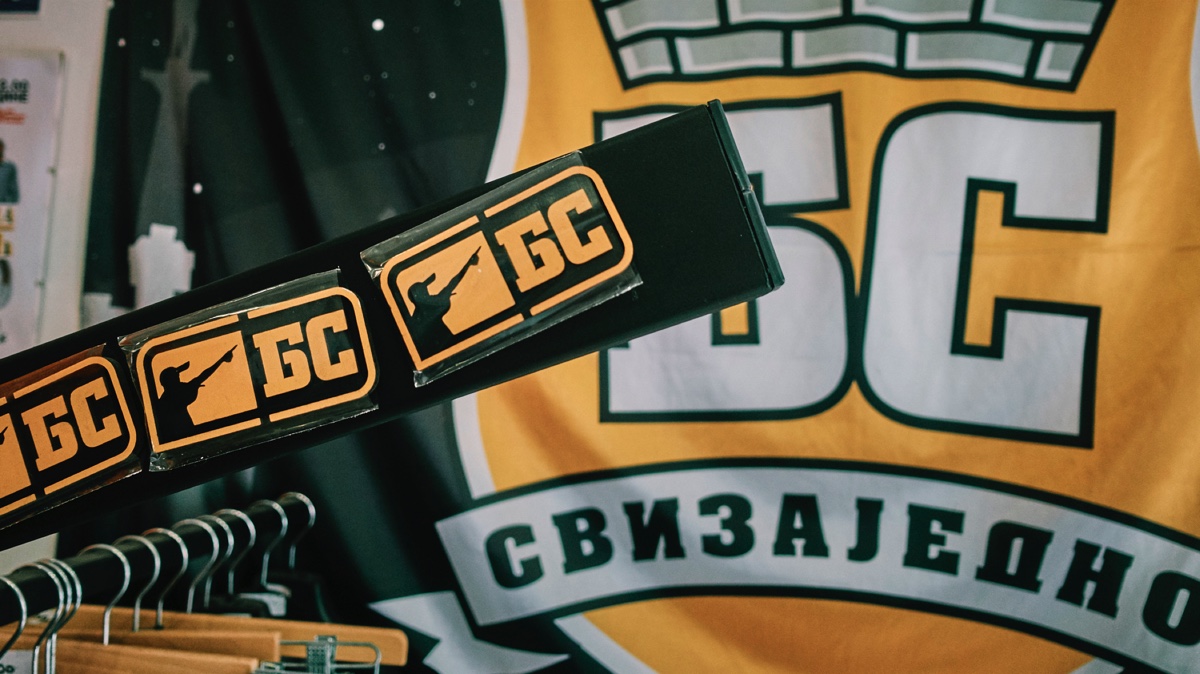
Your concert in the Arena in 2012 showed that "Beogradski sindikat" is greater than many thought you were. Can we expect a similar concert soon?
Fedja: We hope so. We won't retire before we've done a really big concert in Belgrade. We believe that we could easily be undermined at the moment. Even with the last concert many were asking us if we really were able to fill up the "Arena". We were highly stressed by all the doubt because we knew there were so many people who couldn't wait for us to fail so they can say that some other band is more relevant to young audience.
I think right now there are more people than any other time who would like that to happen. Even back in 2012, when our concert was organized by Raka Maric, he couldn't believe how many guest appearances that we were supposed to have got cancelled. He said he'd never experienced anything like that in his career.
We're wise enough to recognize the right moment, to find a crack to slip through and find the right moment and place for our big concert.
You perform abroad. In Russia, you collected funds to help people in Kosovo and Metohija.
Skabo: That was organized by the Society of Serbo-Russian friendship from St. Petesburg, for an entirely Russian audience. It was a fantastic atmosphere because for a long line of years our lyrics were popular in Russia because they worked really well in translation. Our first concert in Russia took place in 2009 and already next year when YouTube went global, many of our songs were re-worked under Russian titles and even used in some of their movies.
We get a lot of Russians in my establishment where I work, asking when we'll visit their country again.
So far we've had three concerts in Russia. We sadly don't get invited so I don't know what the deal is there, but there's no denying that in Russia "Beogradski sindikat" has a surprisingly numerous audience.
It's a big country so maybe in percentages that doesn't come down to a lot. But we have enough fans to make a significant contribution for charity or commercial purposes.
In our near future we can expect a book about "Beogradski sindikat".
Fedja: Our friend, the writer Marko Tanaskovic is working on the book. The plan is to have it published before the Belgrade Book Fair in October, so we're now eagerly awaiting the initial manuscript. We're so happy to have Marko tell that story, because it means more to have someone else write about us than for us to praise or criticize ourselves.
Skabo: I think the book will be similar to a documentary and more serious than we actually are. :) That's the whole idea behind "Beogradski sindikat" to come out with a synnergy greater than our individual selves.




 6 ℃
6 ℃

